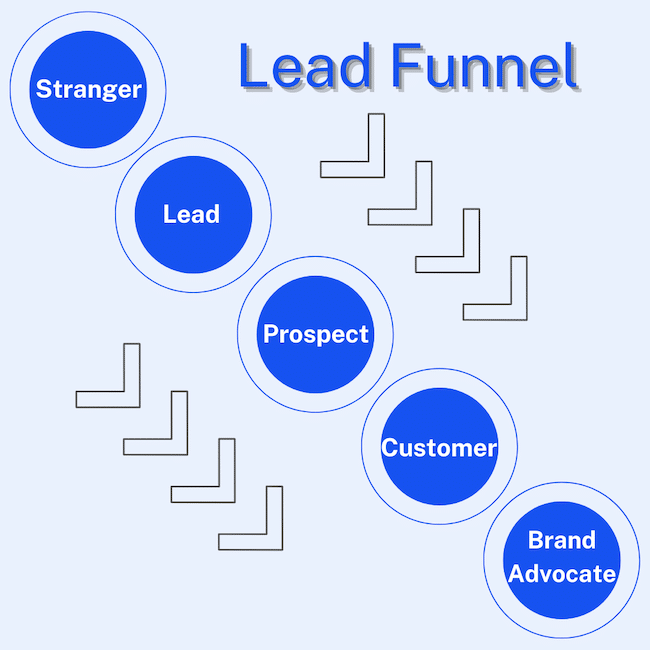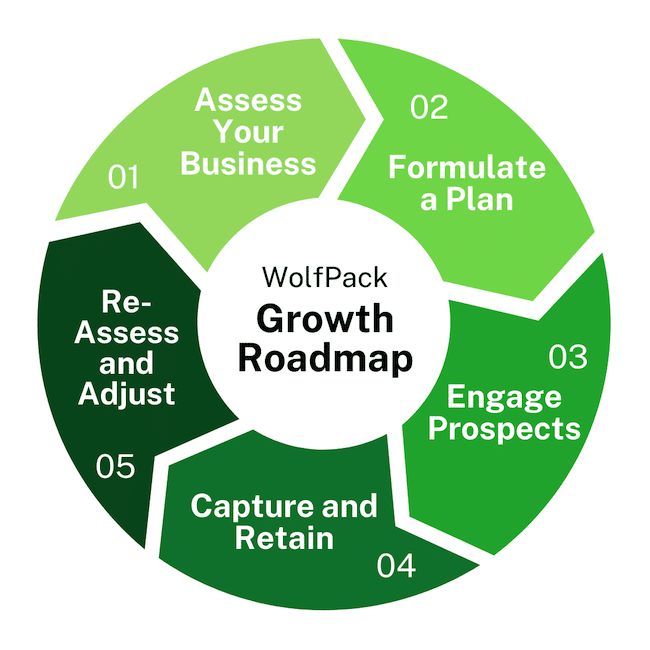Last updated on December 23rd, 2024 at 01:33 pm
Hardly any business owners will tell you that they do not want their business to grow. Regardless of the industry, the one thing almost all entrepreneurs have in common is the desire the bring their product or service to more people. But where should one begin? There are so many variables and digital marketing strategies to consider! Here are some elements to consider when implementing a business growth strategy.
Elements to Consider
- The Current State of Your Business
- Expectations and Goals
- Budget and Timeline
- Marketing Conditions and Competitors
- Target Audience
- Current Level of Marketing Expertise
- Outsourcing vs Hiring Internally
Let’s dive deeper into each of these areas to see how they apply to your business.
The Current State of Your Business
Realistic Expectations and Goals
According to Forbes, in 2023, “1 out of 3 businesses still don’t have a website”. In our very digital world, it cannot be a realistic expectation to experience a spectacular ROI from a digital marketing business growth strategy without one. It is important to evaluate the current state of your digital footprint before setting goals and creating expectations for the future. If you do not consider your current business conditions before selecting marketing strategies, you will be disappointed by the outcome.
First, consider making a list of all of the efforts you are currently making in the digital marketing space. Evaluate if any strategies you are currently using are profitable. If they are, consider increasing the budget in those areas. If they are not, it may be time to make small adjustments, such as the keywords you are targeting, or change marketing strategies altogether.
Budget and Timeline
Next, consider your budget and timeline. For instance, if you are in need of leads very quickly, pay-per-click advertising should be a part of your digital growth plan. However if you are looking for more long-term play, search engine optimization should be included in your game plan.
Market Conditions and Competitors
Next, consider doing some research into the performance of your local competition. For example, if you are interested in adding social media to your growth plan, do some research into the audience size, activity, and engagement metrics of your local competitors. Also, look into what platforms they are using and what types of content they are posting. Many reputable marketing agencies can complete this research for you.
Also, consider the overall market conditions. Companies that continue to focus efforts on digital marketing plans during recessions what shown to be the most successful following those recessions. However, be aware that sometimes these efforts may result in business maintenance rather than growth during these down-market periods.
Target Audience
Don’t forget to keep in mind your target customer. When building a growth plan, selecting digital marketing strategies that fit who you are trying to connect with is imperative.
For example, if your target audience is young homeowners from the ages of 25-35, social media including Instagram is imperative to include in your business growth strategy. On the other hand, if you are looking to target a more seasoned crowd, Facebook or physically mailed advertisements are necessary.
Also, remember that it may take multiple interactions or digital marketing mediums to convert a stranger into a customer.

Your Current Level of Marketing Expertise
Before jumping into a business growth strategy with two feet, consider how knowledgeable you are on the topic. Take some time to do research on the strategy you are interested in trying. While one might consider this research a waste of time, it can save you from making costly mistakes in your business growth journey. There are many resources available that can give you valuable information for free such as digital marketing blogs.
If you start doing some research into a digital marketing strategy or growth plan and realize it is much more complex than you originally suspected, consider consulting with a digital marketing agency that specializes in such strategies. For example, here at Wolfpack Advising, we have seen many pay-per-click advertising campaigns. Through trial and error and years of research, we have learned what could work for your business goals and needs. We also have created a business growth roadmap that is available for free to help you make informed decisions related to your business growth strategy.

Outsourcing Vs Hiring Internally
Now that you have done some research and fully understand the knowledge required to carry out a digital marketing growth plan, you have to decide if you are going to hire a professional or handle the project internally.
Here are some pros and cons of each…
Outsourcing Work On Your Digital Marketing Growth Strategy
Pros
Access to more expert knowledge – You can save time when it comes to researching and troubleshooting the best practices for each type of marketing.
Consulting – You will have the ability to email or call in with questions or adjustments you may have.
Less time and money wasted on trial and error – Your professional will know what works for companies similar to yours.
Connections to other clients in your industry – Many reputable marketing companies service many clients in the same industries. Some marketing companies will even host events such as group meetings or conferences for you to collaborate with other businesses also trying to expand.
No hiring or training – Many businesses hire a digital marketing rep in-house, but then find that when the market dips, they have to let that person go. When you outsource your marketing efforts, you can easily adjust to the market. You can even pause or change your services for a few months. You do not have to be concerned with paying a full-time employee every two weeks.
Cons
Paying a Premium – Any marketing professional being hired is going to charge for their time and knowledge on top of the cost of the marketing material itself. For example, when running Google Ads, you will have to pay Google for the cost of the ads. But if you hire someone to manage and optimize the campaigns for you, that will be at an additional charge.
Commitment – Depending on who you choose to help you through your digital growth journey, you may have to commit to a contract. However, that is not the case will all marketing agencies. For example, Wolfpack’s digital marketing services are month-to-month and you are allowed to cancel anytime.
Lack of Control – When outsourcing, you give up some control of your digital marketing efforts. While reputable digital marketing agencies will keep you involved in the process, you will have to pass over trust to someone outside of your business and allow them to make some critical decisions.
Conclusion
Taking the step to implement a business growth strategy can be a daunting one. But you can do it! Assess your current situation, select which digital marketing mediums you want to utilize, and decide who is going to carry out the plan. Looking for more support during your business growth journey? Wolfpack Advising is here to help! Schedule a consultation and we would be happy to help you through our growth roadmap!




